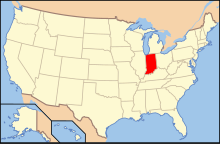LGBTQ rights in Indiana | |
|---|---|
 | |
| Status | Legal since 1977 |
| Gender identity | State does not require surgery to alter sex on official documents |
| Discrimination protections | Sexual orientation protection in employment (per court ruling). Sexual orientation and gender identity protections in state employment |
| Family rights | |
| Recognition of relationships | Same-sex marriage since 2014 |
| Adoption | Same-sex couples allowed to adopt |
Lesbian, gay, bisexual, transgender, and queer (LGBTQ) rights in the U.S. state of Indiana have been shaped by both state and federal law. These evolved from harsh penalties established early in the state's history to the decriminalization of same-sex activity in 1977 and the legalization of same-sex marriage in 2014. Indiana was subject to an April 2017 federal court ruling that discrimination based on sexual orientation is tantamount to discrimination on account of "sex", as defined by the Civil Rights Act of 1964. The ruling establishes sexual orientation as a protected characteristic in the workplace, forbidding unfair discrimination, although Indiana state statutes do not include sexual orientation or gender identity among its categories of discrimination.
Historically, Indiana had severe penalties in place for same-sex activity, including the death penalty for sodomy, until decriminalization in 1976. Same-sex marriages have been recognized and performed in Indiana since 2014, when the U.S. Supreme Court refused to consider an appeal in the case of Baskin v. Bogan. There had been regular attempts to adopt a constitutional amendment defining marriage as a union between a man and a woman since 2004, but they have failed. Indiana previously tracked bias crimes, including those based on sexual orientation, but did not enhance sentencing for such crimes until April 2019 when the state passed a hate crimes law allowing judges to impose harsher sentences for crimes committed with intent to harm or intimidate based on perceived or actual characteristics.
In 2004, Governor Joe Kernan issued an executive order protecting state employees from discrimination based on sexual orientation and gender identity, which was further reinforced in 2005 by Governor Mitch Daniels, though state statutes do not include these categories among its non-discrimination grounds. Indiana's 2015 Religious Freedom Restoration Act faced significant backlash from groups which argued it targeted LGBT rights and was later clarified to prevent discrimination based on sexual orientation and gender identity.
In May 2023, Indiana passed HB 1608, prohibiting classroom instruction on "human sexuality" from kindergarten to third grade and requiring schools to inform parents if a minor student requests a change in name or pronouns. A federal judge upheld an injunction in August 2023, preventing Indiana schools from restricting bathroom access for transgender students. Transgender people in Indiana can change their legal gender on birth certificates but do not have the option for a non-binary marker. In March 2023, Indiana passed a bill banning gender-affirming healthcare for minors, which took effect in February 2024, and in April 2023 the state banned gender-affirming healthcare within prisons. Indiana statutes allow single LGBT persons and same-sex couples to adopt. A federal ruling in 2016 required the state to list both same-sex parents on birth certificates. In May 2023, the Governor signed a law prohibiting local governments from enacting bans on conversion therapy, effectively keeping the practice legal statewide.
A 2022 Public Religion Research Institute poll found that 67% of Indiana residents supported same-sex marriage, 78% supported anti-discrimination laws covering sexual orientation and gender identity, and 57% opposed allowing public businesses to refuse service to LGBTQ people based on religious beliefs.